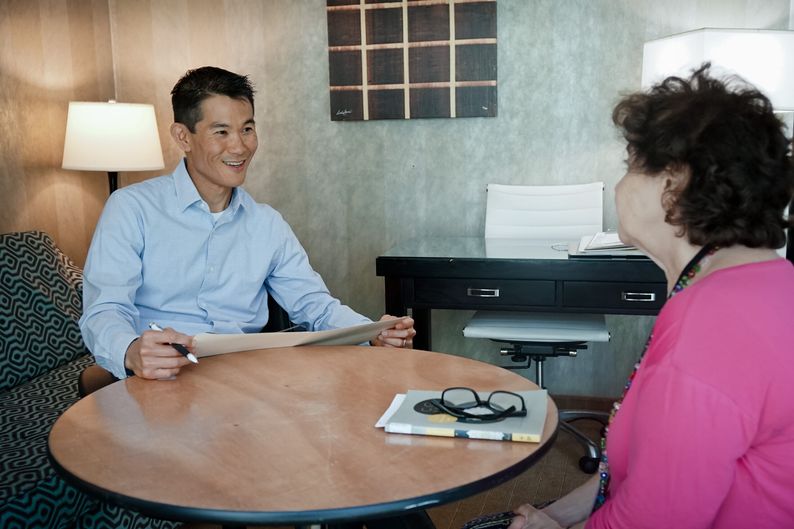C. Scott Campbell: IBS (Irritable Bowel Syndrome)
Age 55, Teacher
My poor intestinal health saved my life
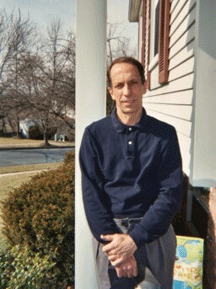 I first met Dr. McDougall on the PBS “Late Night America” TV Show with Dennis Wholey more than 20 years ago. My initial thought was, “he made sense.” But my real motivation was my bowels. As I listened to his recommendations for a healthy diet, it occurred to me that this was an answer to my prayers. I occasionally suffered from irritable bowel syndrome (IBS). This meant to me 45 minutes of excruciating cramps and waves of abdominal pain until my bowel was completely evacuated. The agony was so intense that I would break out in a sweat, experience light-headedness, and numbness in my fingertips. I was hesitant to go anywhere for fear I would have an attack. Not knowing why it happened or unable to predict its onset was both baffling and frightening. As the years went on, I became reluctant to stray too far from the privacy of my own bathroom. I did not look forward to social gatherings, lengthy trips, or any occasion where an attack of IBS might inconvenience others and embarrass me. To this day, I am still gun shy about such activities. I saw my doctor for a bowel exam (sigmoidoscopy) and was given tranquilizers to relax me. Fortunately, my good wife has been so patient with my health problems and for my need for change in my diet.
I first met Dr. McDougall on the PBS “Late Night America” TV Show with Dennis Wholey more than 20 years ago. My initial thought was, “he made sense.” But my real motivation was my bowels. As I listened to his recommendations for a healthy diet, it occurred to me that this was an answer to my prayers. I occasionally suffered from irritable bowel syndrome (IBS). This meant to me 45 minutes of excruciating cramps and waves of abdominal pain until my bowel was completely evacuated. The agony was so intense that I would break out in a sweat, experience light-headedness, and numbness in my fingertips. I was hesitant to go anywhere for fear I would have an attack. Not knowing why it happened or unable to predict its onset was both baffling and frightening. As the years went on, I became reluctant to stray too far from the privacy of my own bathroom. I did not look forward to social gatherings, lengthy trips, or any occasion where an attack of IBS might inconvenience others and embarrass me. To this day, I am still gun shy about such activities. I saw my doctor for a bowel exam (sigmoidoscopy) and was given tranquilizers to relax me. Fortunately, my good wife has been so patient with my health problems and for my need for change in my diet.
I purchased John’s book, The McDougall Plan, and consumed the information within like a starving man. Consequently, my wife and I eschewed our familiar diet, and entered into a strange new world of “exotic” foods. There were frequent visits to health food stores, both near and far. We attended conferences, some of which featured Dr. McDougall. But, most importantly, the harsh episodes of IBS ended. And yearly physicals, complete with blood work, have confirmed the general health supporting characteristics of the McDougall regimen. I lost 10 pounds initially (150 to 140 pounds) while I was adjusting to the diet, but have since gained that back and have been at the same weight for the past 2 decades.
I have visited my doctor annually since my conversion. His responses were, “What ever you are doing, just keep doing it” and “What you are doing is not practical for most people.” He has since retired, and my new physician is more sympathetic.
Although I have not revisited those agonizing bouts on the commode, I still occasionally experience milder IBS symptoms. This I attribute as much to lifestyle as food. The research continues as to why some folks have digestive systems that are more sensitive to emotional or environmental stimulation. As a friend once told me, “Maybe it’s not so much what you’re eating, as what’s eating you!” We all have to slow down at times and get centered again. Nevertheless, Dr. McDougall’s emphasis on a high-fiber and high-carb diet has given me freedom from previous discomforts.
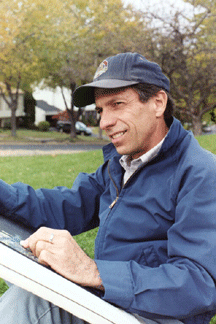 I am a public high school art teacher. I have about 160 students and sometimes a few ask me about my diet. They, like others, are especially concerned about the usual nutritional misinformation – like where do I get my calcium and my protein? About ten years ago, while serving as golf coach, I accompanied two of my players to a restaurant after district competition. They were visibly stunned when I ordered pizza without cheese.
I am a public high school art teacher. I have about 160 students and sometimes a few ask me about my diet. They, like others, are especially concerned about the usual nutritional misinformation – like where do I get my calcium and my protein? About ten years ago, while serving as golf coach, I accompanied two of my players to a restaurant after district competition. They were visibly stunned when I ordered pizza without cheese.
There are moments of levity, as well. One day, prior to playing a round of golf, I was munching on a red beet and spinach sandwich that I had brought along. My playing companion was startled at the crimson hue in my mouth and thought that I had bitten my tongue or lip. Not long after that, this same friend invited me on a golf trip to Myrtle Beach, South Carolina. When I expressed concern about finding my kind of food, he waved me off, “I’ll eat at the snack bar. You can forage on the course.”
In one way I figure I was blessed to have intestinal trouble. At least I didn’t have to wait until I had a heart attack to wake up. I will be retiring soon – I am now 55 – and expect to continue enjoying life – which is a big contrast to many of my contemporaries.
C. Scott Campbell
Dr. McDougall’s Comments:
What would it take to make you change your diet? A few ruined social events (like Scott Campbell) or fear for your life? You might think those with the most serious health problems are the most likely to seek the ultimate solution and change their diet. During my more than 25 years of active medical practice I have not found this to be the case. I am always amazed when people suffering with cancer or on the verge of sudden death from heart disease explain that changing their diet is simply too much to ask – just too difficult and far too radical. Equally as many people with non-life threatening troubles like arthritis or bowel distress (like Scott Campbell) are motivated to make long-overdue changes. Extending this even further, I have also found that “perfectly healthy people,” merely wanting to avoid future troubles, are just as likely candidates for changing their diet and starting an exercise program. In other words, what motivates change is highly personal and unpredictable to me.
To date there have been three factors that have helped me foretell who will do well:
1) Successful people win at health, too. My medical practice is largely made up of people who enjoy life and as a result they have expended great effort to improve themselves in many ways. In general, these people are well educated, have productive careers, and functional families (like Scott Campbell). Their attitude is, “Why should I accept less than the best for myself? I’ve worked hard to get everything else in my life, why should I do less for my health?” Teachers, ministers, doctors, and business owners are common examples of the occupations of my patients. As unkind as this may sound, people who fail in other areas of their life, most often fail at their health, too.
2) Repetitive experience makes for success. One of the first things I learn about people who attend my 10-day, live-in program in Santa Rosa, CA is their history of changing their diet. I am happiest to hear they have tried and failed many times – yet have been tirelessly working on making the change for years. Because of their previous efforts, every one of these people now succeeds with a little guidance. On the other hand, I am a little distressed when I learn attendees have never heard about McDougall until their well-meaning employer, friend or relative insisted they come to our live-in program. Although they make tremendous strides in this short time, I have few expectations that they will be fully converted to our way of eating and living after just one session.
3) Supportive people smooth the path to success. A spouse, other family member, or very close friend already following the program, makes the transition almost effortless – especially when their relationship is a healthy one – and they care deeply for each other. They insist on the best health for those they love, because sickness would cause great misery for all concerned. In order to preserve happiness, knowledge of shopping, eating out, and food preparation is shared and help is freely given.
I have also learned that I am frequently wrong with my predictions of who will fail and succeed. Therefore, to minimize the impact of my misjudgments, and avoid missing any potential “Star McDougaller,” I always give my best effort and I never give up trying to help anyone who will listen. You should do the same and quickly you will experience one of life’s greatest rewards: the true happiness that comes from helping others.
You can learn much more about irritable bowel syndrome (IBS) and other forms of colitis from my September 2002 newsletter article, “In Search of the Perfect Bowel Movement” and my November 2002 article, “Chained to the Bathroom” found under Newsletter Archives at www.drmcdougall.com.
Recommended Articles
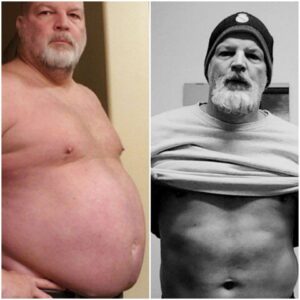
Vance: Lost 92 pounds
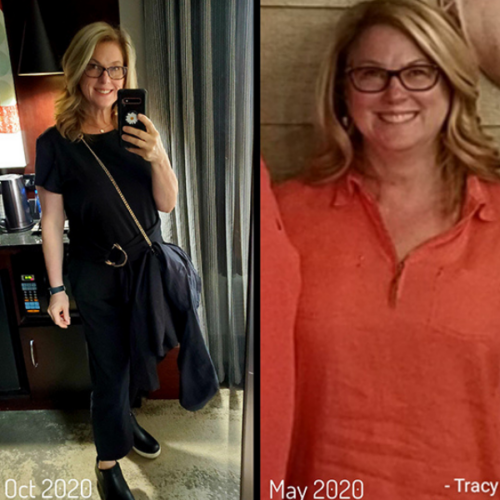
Tracy Found a Sustainable Lifestyle that Reversed her Type 2 Diabetes and High Blood Pressure






